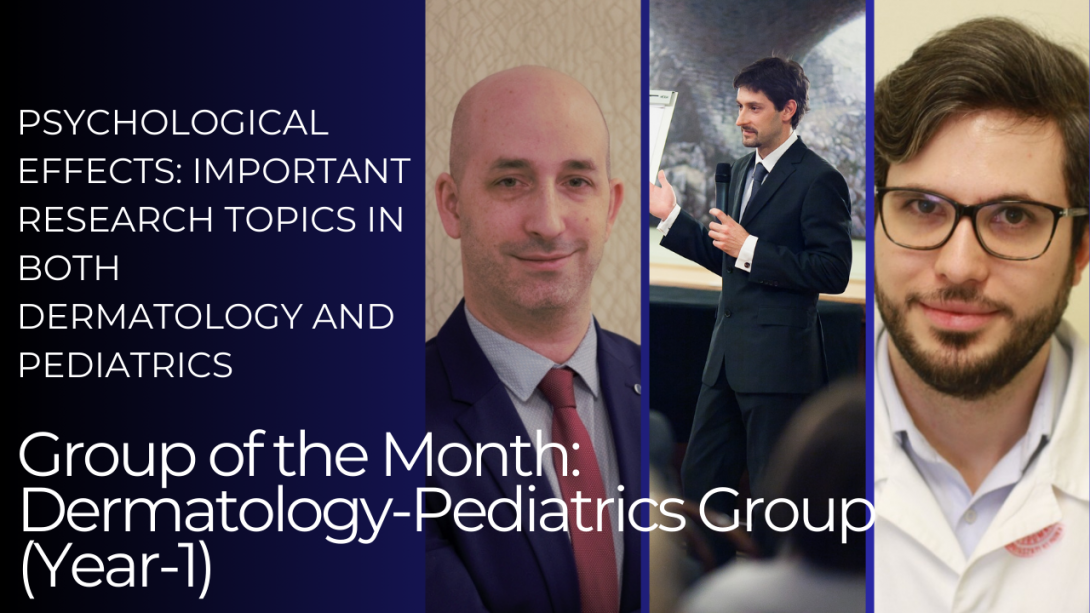
All students in the group have fascinating topics, and all of them perform outstandingly. The leaders are dedicated and committed to their work, and conscientiously support the students in their research. In October, the Dermatology-Pediatrics group (Year 1) was named the Best Group of the Month.
The Dermatology-Pediatrics Group is led by Dr. András Bánvölgyi, Dr. Norbert Kiss, and Dr. Csaba Lódi, who have high dedication and commitment, and are supportive of the students who are performing outstandingly. “The topics of our group are all fascinating. Seven of them are dermatological, one is investigating the accuracy of optical diagnostic imaging techniques for basal cell carcinoma. Since it is the most common skin tumor and also the most common malignant tumor, it is important to find the best way to diagnose it. We also have two topics dealing with the microbiome. It is a fascinating topic because the microorganisms on our skin may play a role in developing atopic dermatitis and may also be risk factors for acne,” says Dr. Norbert Kiss. The group also has a research topic on psoriasis, investigating how new biological treatments affect the risk of cardiovascular disease in patients with psoriasis.
“One of our Ph.D. students is conducting research on psychotherapy in atopic dermatitis. This is an important topic because stress can also worsen symptoms in people affected by this disease. For this reason, it needs to be clarified whether it could support therapy if patients attend psychotherapy or even consult a psychiatrist.” There is also a dermatology research topic that investigates how biological therapy for psoriasis affects the risk of inflammatory bowel disease. There is also a research on a skin disease called hidradenitis suppurativa, which affects 1% of the population but is often unrecognized.
“Four students are researching in pediatrics, with topics in nephrology, gastroenterology, pediatric intensive care, and neonatology. One of them is researching the role of psychological interventions in pediatric inflammatory bowel disease, aiming to improve pediatric IBD patients' health and quality of life. This study is important because current guidelines for IBD focus on drug therapy, and the psychological approach is neglected. The second topic of this student is the impact of depression and anxiety on IBD activity,” says Dr. Csaba Lódi. The other Ph.D. student, who is also a pediatrician, is investigating the optimal nutritional therapy of critically ill children for better outcomes. The current recommendation is that nutritional therapy should be started on day seven, but it might be more beneficial to start it earlier. Another interesting research topic is the effect of higher protein intake on the mortality and recovery of critically ill children.
The group also includes a resident who is researching IgA vasculitis with nephritis. She is investigating the predictive accuracy of serum and urinary biomarkers for renal damage in pediatric patients with IgA vasculitis. If this method could be used to screen children with kidney damage at an early stage, treatment could prevent the onset of kidney failure. Another research project of this student aims to determine the most accurate method to predict the prognosis of the disease. A psychologist who is a Ph.D. student is also doing research on pediatrics. She is investigating the prognostic accuracy of different biomarkers for the detection of neurocognitive deficits in children with neonatal encephalopathy. In her other study, she wants to reveal the early indicators of language difficulties and their connections to perinatal insults. The results of this research might give newborns with perinatal brain injury the chance to be able to speak as a child.
(Szabó Emese)